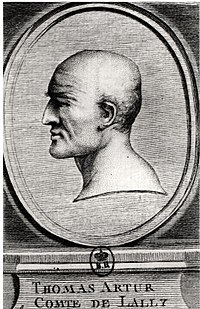Background
Thomas Artur Lally was born at Romans, Dauphine, in January 1702, being the son of Sir Gerard O'Lally, an Irish Jacobite who married a French lady of noble family, from whom the son inherited his titles.


Thomas Artur Lally was born at Romans, Dauphine, in January 1702, being the son of Sir Gerard O'Lally, an Irish Jacobite who married a French lady of noble family, from whom the son inherited his titles.
Entering the French army in 1721 he served in the war of 1734 against Austria; he was present at Dettingen (1743), and commanded the regiment de Lally in the famous Irish brigade at Fontenoy (May 1745).
He was made a brigadier on the field by Louis XV.
He had previously been mixed up in several Jacobite plots, and in 1745 accompanied Charles Edward to Scotland, serving as aide-de- camp at the battle of Falkirk (January 1746).
Escaping to France, he served with Marshal Saxe in the Low Countries, and at the capture of Maestricht (1748) was made a marshal de camp.
He was a man of courage and a capable general; but his pride and ferocity made him disliked by his officers and hated by his soldiers, while he regarded the natives as slaves, despised their assistance, arid trampled on their traditions of caste.
In consequence everything went wrong with him.
He was unsuccessful in an attack on Tanjore, and had to retire from the siege of Madras (1758) owing to the timely arrival of the British fleet.
He was defeated by Sir Eyre Coote at Wandiwash (1760), and besieged in Pondicherry and forced to capitulate (1761).
He was sent as a prisoner of war to England.
While in London, he heard that he was accused in France of treachery, and insisted, against advice, on returning on parole to stand his trial. He was kept prisoner for nearly two years before the trial began; then, after many painful delays, he was sentenced to death (May 6, 1766), and three days later beheaded.
